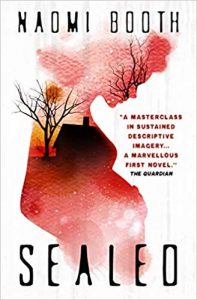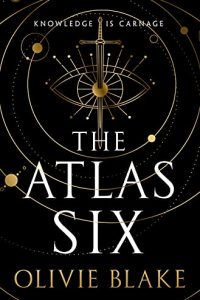Katharine Coldiron Reviews Sealed by Naomi Booth
 Sealed, Naomi Booth (Dead Ink 978-1-911-58513-8, £9.99, 150pp, tp) October 2017. (Titan 978-1-78909-124-3, $14.95, 240pp, tp) July 2019.
Sealed, Naomi Booth (Dead Ink 978-1-911-58513-8, £9.99, 150pp, tp) October 2017. (Titan 978-1-78909-124-3, $14.95, 240pp, tp) July 2019.
Looking for a book more depressing and upsetting than Margaret Atwood’s apocalyptica? Naomi Booth’s Sealed is the one for you.
Set in the near future in Australia, this speedy novel follows a woman in late pregnancy trying to live as safely as she can among terrors and dangers that, though fictional, feel distinctly real. Alice and Pete leave “the city” for Lakoomba, a country town with few residents and little infrastructure. Pete is excited to be living in a place with fresh air and a social environment that suits his affable laziness, but Alice feels trapped. Prior to these last months of her pregnancy, she worked in public health, and had been tracking a new disease called cutis, in which people’s skin grows rampantly over their orifices and often kills them (from suffocation or sepsis). Meanwhile, she had been trying to expose aspects of “the camps,” privately run facilities which collect and house citizens too poor to live on their own.
Alice is jammed full of fears: of food, of water, of the fetus in her body, of the camps, of the accelerating fires, of the smog, and particularly of cutis. Of course, she has good reason for these fears; she studies the health impacts of the poisoned environment and knows its true risks. Sometimes, her runs of anxiety seem over the top: “Paulie turns back to the barbie, which is smoking blackly. The whole thing stinks of burning toxins. The charcoal for one thing is giving off poisonous fumes: carbon monoxide… And the smoke’s just the start of it: I can see a black crust forming on the unprotected meat. Hydrocarbons, totally fucking poisonous.”
Is Alice a germaphobe or is she in the right to be afraid of everything she inhales and touches? It’s already a question in our current moment – is it really necessary to eat organic lettuce and avoid milk with rBST? Everything Alice fears is rooted in something real, and, at the most desperate moments in Sealed, the sense that she has no good options at all, nowhere to go, no one to depend upon, is also quite real.
Sealed is a scary book, at the macro, society-is-breaking-down level, but also at eye level. It’s also a deeply internal book, shored up with exceptional description, with spiraling thoughts and memories that take up entire chapters. Alice is a complex character, an introvert whose fears extend to the metaphysical (“I… see every person and every place as a contagion to be guarded against”), mired in a bad situation, due to circumstances beyond her control and her own poor decisions. It’s difficult to live in her world, but very easy to live in her head.
The last 40 pages of Sealed describe the birth of Alice’s child. It’s one of the most harrowing pieces of prose I have ever experienced. The body horror quotient of the book is already pretty high, because being sealed in by one’s own skin is pretty intense, but Booth’s description of birth evokes a degree of body horror even Cronenberg couldn’t touch:
It’s as though my vertebrae have come alive now, a long snake of bone working its way downwards, pushing to rip itself out through the bottom of my back. As I push back, the eyes in the wooden floor stare up at me… and invisible things inside me pulse, organs and bones throbbing to break free. Everything inside and outside of me has come alive, charged with horrible animation. I shout the pain out, I scream it.
Booth’s point, ultimately, is that birth is not too distant from death, and certainly not from the kind of death cutis brings. Alice’s body has functions bent on destroying her, machinery she can’t control. Over and over again, the elements of Alice’s life betray her (people, bosses, food, government, her own body), and she can do nothing to guard against any of it. She can only bear down.
The final pages of Sealed have a tiny degree of redemption, but it isn’t enough. People are inevitably going to be rounded up and taken to camps; cutis will seal them all into their bodies, silent and then dead; the precautions Alice takes to keep herself safe will come to nothing. There is no escaping air or water or earth, all of which are irrevocably polluted. This book is the novel equivalent of those projections that indicate the human race will not make it past the year 2100. For so many reasons, it’s unforgettable (despite its weirdly forgettable title), but you will not find a more distressing read this year.
Katharine Coldiron is the author of Ceremonials (Kernpunkt Press), an SPD fiction bestseller. Her work as a book critic has appeared in The Washington Post, The Believer, The Guardian, and many other places. She lives in California and at kcoldiron.com.
This review and more like it in the January 2020 issue of Locus.
 While you are here, please take a moment to support Locus with a one-time or recurring donation. We rely on reader donations to keep the magazine and site going, and would like to keep the site paywall free, but WE NEED YOUR FINANCIAL SUPPORT to continue quality coverage of the science fiction and fantasy field.
While you are here, please take a moment to support Locus with a one-time or recurring donation. We rely on reader donations to keep the magazine and site going, and would like to keep the site paywall free, but WE NEED YOUR FINANCIAL SUPPORT to continue quality coverage of the science fiction and fantasy field.







